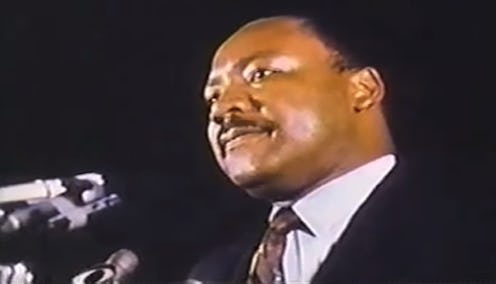News
This Video Of Martin Luther King Jr.'s Final Speech Will Give You Chills
On April 4, 1968, one of the most prominent civil rights icons in American history was killed. And just one day prior, he gave an evocative and stirring speech that went down in history ― Tuesday, April 3 was the 50th anniversary of Dr. Martin Luther King, Jr.'s "mountaintop" speech, delivered shortly before King was assassinated.
Now, precisely a half-century after it was given, people are taking the opportunity to revisit the historic speech. King, who was 39 at the time he was killed, gave the address to a gathering at the Mason Temple in Memphis, Tennessee, on the occasion of the Memphis Sanitation Strike.
In the powerful speech, King called for the striking Memphis sanitation workers to be given fair and appropriate treatment, and championed the cause of black economic advancement. He also denounced an injunction aimed at thwarting the assembly rights of the striking workers, urging America to "be true to what you said on paper" in honoring the First Amendment.
What the speech is perhaps most sharply and tragically remembered for, however, is King's reflections on his life, and his lack of concern over the possibility of an early and untimely death. These words, which came at the very end of his speech, proved grimly prophetic when he was murdered just one day later.
Well, I don't know what will happen now. We've got some difficult days ahead. But it really doesn't matter with me now, because I've been to the mountaintop. And I don't mind. Like anybody, I would like to live a long life ― longevity has its place.
But I'm not concerned about that now. I just want to do God's will. And he has allowed me to go up to the mountain. And I've looked over, and I've seen the Promised Land. I may not get there with you. But I want you to know tonight that we as a people will get to the Promised Land. So I'm happy tonight, I'm not worried about anything, I'm not fearing any man. Mine eyes have seen the glory of the coming of the Lord.
If you'd like to read a transcript of the full text of King's final speech, you can find one here, courtesy of ABC News. The full address, which spans about 43 minutes, can be heard in full here ― if you have the time, it's most definitely worth it.
In addition to matters of civil rights and racial justice ― which figured centrally in the strike ― King was an outspoken voice in support of labor rights, and against American militarism, including opposition to the Vietnam war. In the modern context, King is often revered and touted in mainstream American culture, ignoring that fact that while he was alive, he was regarded as a radical and often loathed figure. In fact, a Gallup poll from 1966 found that two-thirds of Americans had a negative opinion of King.
It was his civil rights activism that left his life in regular peril ― he survived an earlier assassination attempt in 1958, and in 1964, the FBI sent a letter to King which some have interpreted as urging him to commit suicide.
King also specifically criticized what he called "the white moderate," calling such white Americans a greater "stumbling block" to civil rights than even the Ku Klux Klan, in his famous "Letter From a Birmingham Jail" written in 1963.
I have almost reached the regrettable conclusion that the Negro’s great stumbling block in his stride toward freedom is not the White Citizen’s Council-er or the Ku Klux Klanner, but the white moderate, who is more devoted to “order” than to justice; who prefers a negative peace which is the absence of tension to a positive peace which is the presence of justice; who constantly says: “I agree with you in the goal you seek, but I cannot agree with your methods of direct action”; who paternalistically believes he can set the timetable for another man’s freedom; who lives by a mythical concept of time and who constantly advises the Negro to wait for a “more convenient season.”
In short, King's litany of public addresses and speeches are, to this day, of immense value, as well as political importance. And with countless people all over the world mourning his untimely death and remembering his legacy on Wednesday, it's as good a time as ever to revisit some of his impactful words.
